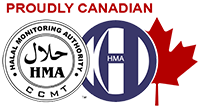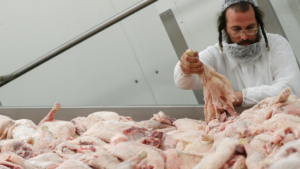The Toronto Star – THE SIGN SAYS HALAL, BUT IS IT REALLY?
Nicole Baute
STAFF REPORTER
The sign says halal, but is it really?
A Muslim not-for-profit organization says that even though meat might be advertised as halal, that doesn’t ensure it is slaughtered according to Qur’an guidelines. And the Halal Monitoring Authority admits its growing influence on halal food has upset some businesses.
“In the process of establishing this organization and growing rapidly, in a number of years, we are making enemies,” said Imam Yusuf Badat of the monitoring agency.
The monitoring authority was formed as a branch of the Canadian Council of Muslim Theologians after a group of imams toured the country to inspect halal slaughterhouses, abattoirs and meat processors in 2004. Some were registered with U.S. halal certifying bodies; many just purported to sell halal products.
What they found astounded them, Badat said – some of the men doing the slaughtering did not recite the name of Allah at the time of the slaughter, while others were not Muslim. Some used mechanical blades to cut the meat; others contaminated it with non-halal meat.
In Arabic, the word “halal” means “lawful” or “permitted.” The universal term refers to anything allowed by sharia – Islamic law grounded in the Qur’an.
In 2006, the HMA began a full-fledged effort to monitor halal slaughtering practices, encouraging consumers – namely, members of their congregations – to buy meat products certified by the agency. It invited businesses to join for a price: $13.50 an hour for slaughterhouses, abattoirs and meat processors, and between $75 to $150 a month for restaurants, butchers and manufacturers of nonmeat products.
“Upon the demand of the consumer, the plants, one after another, started applying to be recommended by our organization to prepare halal products,” said Badat.
Badat said the monitoring authority’s fees only cover its costs, and that the extra expenses for halal businesses should only result in a three to four cent increase for the consumer. Anything more than that, he said, is “ill-practice.”
According to its website, 14 businesses are registered with the monitoring authority. Badat stressed that joining is optional. “We don’t ask anyone to be certified,” he said.
Akbar Ali Badeshah, owner of Lindsay Zabiha Meat Packers in Sunderland, says the demand for HMA products, coupled with fees he cannot afford, has hurt his business. He usually runs his slaughterhouse two days a week. “Now this week my plant is closed,” he said yesterday. “I don’t have any business.”
Badeshah said his wholesale customers were demanding he be certified by the authority, because their customers were following the advice of their imams. He said HMA was charging him $1,500 a month, the cost of two days a week of supervision, plus administrative costs – more than he was able to pay, especially because his 11-year-old son has been sick and needs expensive medicine. He says he reached an deal with the agency to pay them when he could, but Badat said no such deal was made.
Badeshah’s certification was withdrawn last week because he was not able to pay the money owed.
Eliss Kontos, owner of Mr. Greek Meat Market on Danforth Ave., recognizes that HMA certification is pricey. “A lot of people don’t want to become members because of the cost,” he said.
Kontos said he pays about $500 a month to the agency, the cost of having an inspector supervise the slaughter of approximately 2,000 lamb, 100 cattle and 100 calves.
Kontos said he is happy with what the agency is doing, and that his sales have gone up because of consumer demand. He said his customers “feel better, 100 per cent reassurance that everything is slaughtered properly.”
But Kontos admitted his profit margin for halal products has gone down due to the added expenses.
While the Ontario Ministry of Agriculture, Food and Rural Affairs and the Canadian Food Inspection Agency monitor all slaughterhouses for health and safety standards, they do not have specific halal licences or regulations.
Ravi Rai, a red meat program specialist with the Canadian Food Inspection Agency, said the HMA is listed with them as a monitoring authority, which gives them permission to label meat halal. But Rai said the government does not regulate the practices of these bodies and that he doesn’t know how much HMA charges members.
Susan Murray, spokesperson for the Ontario Ministry of Agriculture, Food and Rural Affairs, said some slaughterhouses are registered with the provincial government as being halal, but that that “is not a specific designation in our point of view.”
“We would know that they say that’s what they’re doing,” she said. “We’re not experts at halal slaughter.”
Badat said the imams consulted with the provincial and federal governments before establishing the agency. “They know what we are and what we are doing,” he said.
Badat said the HMA can barely keep up with demand for its services, thanks to a growing Muslim population and increased awareness about halal practices.
Some halal consumers say that according to the Qur’an they are only responsible for eating what they have been told is halal meat.
“It says halal meat in the sign,” said Melica Abdu. “If they lie to me, that’s their problem.”




